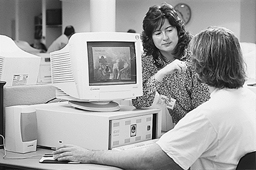Down Your Way
Knowsley Library Learning Resource Centre, Knowsley Library, visited by Sarah Ormes, is a light and airy building which still smells of fresh paint and new carpets. Just six months old, the £2.5 million building is situated in the centre of Knowsley, in the Merseyside Metropolitan Borough of the same name. It was built when the previous library building was sold to make way for a supermarket car park extension. The finance for the Learning Resource Centre came through an imaginative combination of internal funding and a mix of Capital Challenge and Urban money and the European Union’s Single Regeneration Budget (SRB). Additional funding for the new building came from internal sources and also from the sale of the old library. Users have benefited not only from easier parking but also from a new library which probably offers among the most extensive range of free public IT services in any public library in the country.
Additional funding for the new building came from internal sources and also from the sale of the old library. Users have benefited not only from easier parking but also from a new library which probably offers among the most extensive range of free public IT services in any public library in the country.
Although many academic libraries are now familiar with being Learning Resource Centres and hosting banks of computers, public libraries are just beginning to develop such services. Knowsley Library, having moved well beyond the basic stage and developed its own Learning Resource Centre, is generating a lot of interest amongst users and librarians. Knowsley’s Learning Resource Centre is on the first floor of the library. It has 40 PCs and is usually staffed by 3 or 4 full time learning resource coordinators. One of these coordinators, Anna Forsyth, explained that the centre is open whenever the library is open and is always staffed. The learning resource coordinators are on hand to provide help, advice and encouragement to the centre’s users. All the PCs are equipped with standard Microsoft Office software and have access to over 40 networked CD-ROMs (with another 200 due to come online in the near future). Twenty of the PCs also have full Internet access via a high speed network connection. Filtering software designed to prevent people viewing pornography has been installed on the main server.
In its first six months the Centre has proved to be very successful with an average monthly use of over 3000. The Internet workstations in particular are extremely popular and always heavily used. The Centre’s users include children in the library’s homework club, people who have retired and even mothers keeping in e-mail contact with children away at university. Although there are no separate statistics, use is also made of the facility by students from local colleges and universities, usually for word processing, with research being both book and Internet based.
The Centre has also had an impact on the lives of some of its users in other ways. A number of promotional days were organised in the local Job Centre and people were encouraged to come to the library to learn new skills and try searching for work on the Internet. Web pages linked to relevant job information such as The Guardian recruitment pages were also developed. Staff in the Centre then helped work seekers to use these resources and to produce CVs and letters of application. In this area the Centre sees its role as essentially supportive - helping beginners to overcome their distrust of IT, helping users make a start on computer based learning packages and keyboard skills, and enabling users to share experience with each other.
A series of specially designed tasks and worksheets are used to introduce basic IT skills. Later this year it is hoped that the learning achieved by adults in this way will be accredited through the Open College Network. A similar approach is adopted to the preparation of CVs for job seekers. "We often need to give a lot of support but do draw the line at producing them for customers. Often people recognise their skills shortage and return to improve them" said Nick Chandler, Learning Resource Manager. Staff appointed to work in the Centre are all prepared to work in this way, and some of them have teaching qualifications, although as Nick said "Teaching gives the impression of formal courses, and we don’t offer that at the moment, but we do give adults and children a lot of support in using the facilities." The intention is that staff involved in these activities will be offered an Open Learning Tutor Award comprised of a package of TDLB units. Knowsley Libraries Service wants to develop these services rather than just become a place for surfing the Internet.
There is a firm belief that part of the library’s future role must be to support the development of IT skills. The short term development plans focus on the accreditation of learning and the introduction of video conferencing and swipe card technology. The other priority is the development of an effective network linking schools, council departments and library service points. All this will of course depend on money, and Nick Chandler’s response to the funding question was upbeat. "I don’t know where it will come from, but we have invested very heavily in the Centre, it has won national recognition and is seen as a flagship within the authority, so I believe the political will is there to maintain funding."
Author Details
Sarah OrmesPublic Libraries Officer,Officer, UKOLN
Email: lisslo@ukoln.ac.uk
Tel: 01225 826711
